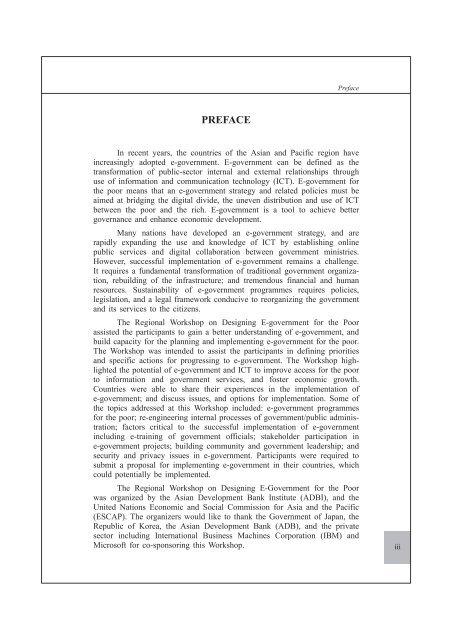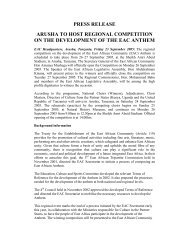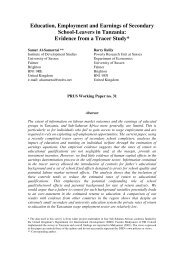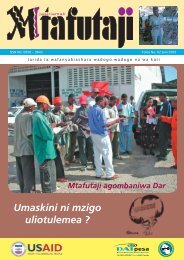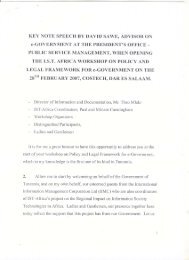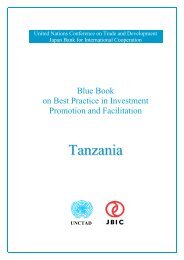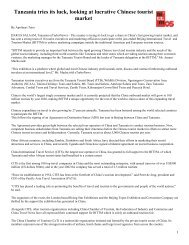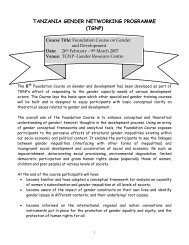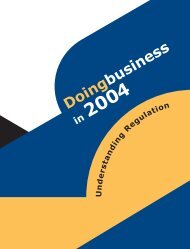Designing e-Government for the Poor - Tanzania Development ...
Designing e-Government for the Poor - Tanzania Development ...
Designing e-Government for the Poor - Tanzania Development ...
Create successful ePaper yourself
Turn your PDF publications into a flip-book with our unique Google optimized e-Paper software.
PREFACE<br />
Preface<br />
In recent years, <strong>the</strong> countries of <strong>the</strong> Asian and Pacific region have<br />
increasingly adopted e-government. E-government can be defined as <strong>the</strong><br />
trans<strong>for</strong>mation of public-sector internal and external relationships through<br />
use of in<strong>for</strong>mation and communication technology (ICT). E-government <strong>for</strong><br />
<strong>the</strong> poor means that an e-government strategy and related policies must be<br />
aimed at bridging <strong>the</strong> digital divide, <strong>the</strong> uneven distribution and use of ICT<br />
between <strong>the</strong> poor and <strong>the</strong> rich. E-government is a tool to achieve better<br />
governance and enhance economic development.<br />
Many nations have developed an e-government strategy, and are<br />
rapidly expanding <strong>the</strong> use and knowledge of ICT by establishing online<br />
public services and digital collaboration between government ministries.<br />
However, successful implementation of e-government remains a challenge.<br />
It requires a fundamental trans<strong>for</strong>mation of traditional government organization,<br />
rebuilding of <strong>the</strong> infrastructure; and tremendous financial and human<br />
resources. Sustainability of e-government programmes requires policies,<br />
legislation, and a legal framework conducive to reorganizing <strong>the</strong> government<br />
and its services to <strong>the</strong> citizens.<br />
The Regional Workshop on <strong>Designing</strong> E-government <strong>for</strong> <strong>the</strong> <strong>Poor</strong><br />
assisted <strong>the</strong> participants to gain a better understanding of e-government, and<br />
build capacity <strong>for</strong> <strong>the</strong> planning and implementing e-government <strong>for</strong> <strong>the</strong> poor.<br />
The Workshop was intended to assist <strong>the</strong> participants in defining priorities<br />
and specific actions <strong>for</strong> progressing to e-government. The Workshop highlighted<br />
<strong>the</strong> potential of e-government and ICT to improve access <strong>for</strong> <strong>the</strong> poor<br />
to in<strong>for</strong>mation and government services, and foster economic growth.<br />
Countries were able to share <strong>the</strong>ir experiences in <strong>the</strong> implementation of<br />
e-government; and discuss issues, and options <strong>for</strong> implementation. Some of<br />
<strong>the</strong> topics addressed at this Workshop included: e-government programmes<br />
<strong>for</strong> <strong>the</strong> poor; re-engineering internal processes of government/public administration;<br />
factors critical to <strong>the</strong> successful implementation of e-government<br />
including e-training of government officials; stakeholder participation in<br />
e-government projects; building community and government leadership; and<br />
security and privacy issues in e-government. Participants were required to<br />
submit a proposal <strong>for</strong> implementing e-government in <strong>the</strong>ir countries, which<br />
could potentially be implemented.<br />
The Regional Workshop on <strong>Designing</strong> E-<strong>Government</strong> <strong>for</strong> <strong>the</strong> <strong>Poor</strong><br />
was organized by <strong>the</strong> Asian <strong>Development</strong> Bank Institute (ADBI), and <strong>the</strong><br />
United Nations Economic and Social Commission <strong>for</strong> Asia and <strong>the</strong> Pacific<br />
(ESCAP). The organizers would like to thank <strong>the</strong> <strong>Government</strong> of Japan, <strong>the</strong><br />
Republic of Korea, <strong>the</strong> Asian <strong>Development</strong> Bank (ADB), and <strong>the</strong> private<br />
sector including International Business Machines Corporation (IBM) and<br />
Microsoft <strong>for</strong> co-sponsoring this Workshop. iii


